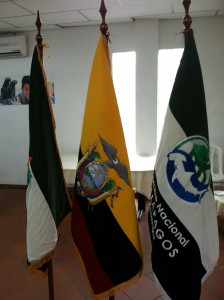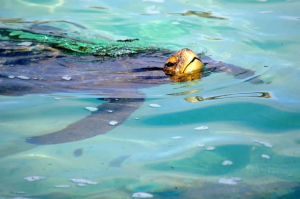The third day of the conference of the parties began with returning to the Sargasso Sea Alliance. The Convention decided further edits to the friendship accord between the Alliance and the IAC would be necessary. These edits included a more legally reassured statement that the accords weren’t legally binding, and the adjustment of references to the United Nations Convention on the Law of the Sea. Unfortunately, toward the end of this discussion, Argentina and Brazil couldn’t agree to the accord without confirming with their capitals. However, both delegations felt that their capitals would approve. Additionally, the representative from the Alliance felt the changes would be accepted by the Sargasso Sea Alliance. Hopefully, the statement of cooperation will be effective in the near future.
Also in the morning, the results of the consultative committee elections were announced, establishing a new group of nine experts to debate sea turtle issues. The COP then proceeded to issue a denouncement of the murder of Jairo Mora Sandoval. The COP sought to insure that Mora’s death would be remembered in sea turtle history and the delegates promised to do all they can to bring those responsible to justice. The COP’s last act was to offer condolences to his family.
Then the COP reverted to the proceedings of legal personality and the hosting agreements. The Convention specifically looked at Annex 4 from the Legal Working Group, which was intended to have the Working Group decide what mechanism (such as a vote) to use to choose a host for the Secretariat. Thereby, the COP revealed there was a near consensus to proceed with the headquarters agreement of legal personality (option 2.) While Panama, Chile, and Costa Rica were unfortunately unable to agree to option 2 without consulting their superiors back in their respective countries, the COP decided to proceed on this course. There was, though, this caveat that if any of the three countries found out their country rejected option 2 within thirty days, the COP would realize there is not a working consensus. Ecuador expressed the opinion that things should move faster, but this position wasn’t held by the entire Convention. Therefore, the COP had or will soon have consensus that option 2 will be the adopted legal personality of choice.
The COP, with a supported statement from the Netherlands delegate, admitted the Secretariat wouldn’t be able to move until the next Conference of the Parties in two years. Moreover, they decided final decisions probably wouldn’t be made during this Conference of the Parties regarding hosting arrangements. However, they did decide who will host the Secretariat and how they will decide who will host could be completed inter-sessionally, between the COPs. Unless an objection is voiced within 30 days, the COP resolved all countries would be considered in approval of the legal personality. The Legal Working Group (consisting of Brazil, the U.S., Mexico and Peru) will have 90 days after the approval to formally decide how to select from the hosting agreements. 180 days after that, by April 30th 2014, all final proposals to host must be accepted by the Secretariat Pro Tempore. The Legal Working Group thought a legal vote would be the most probable decision mechanism. This would not be in lieu of consensus but would help streamline the process. Ecuador requested a footnote be added to express which candidates to host had been received thus far in order to acknowledge Ecuador’s proposals.
After lunch, the COP finished drafting and editing the Work Plan, which outlines what the Secretariat Pro Tempore and Convention bodies (such as the Consultative Committee) will try to achieve before the next Conference of the Parties. One of the most important goals was to include Colombia in the IAC. While a changing administration had been a difficulty in Colombia, the spokesperson on the matter was pleased to announce progress had been made and the documents had been drafted for Colombia’s inclusion. The Work Plan continued many of the Convention’s primary goals for conservation, outreach, and management. One of the more interesting additions was that the COP planned to discuss cooperating with the Ramsar Convention. The Ramsar Convention addresses wetland protection, which seemed closely related to sea turtle habitat and life cycle. The IAC was glad to add this as one of their future goals. The COP also approved the final draft of the budget for the next two years.
The COP then returned to the discussion of legal personality and hosting arrangements one last time. They decided upon the timetable outlined above and expected the COP would be voting on or considering soon after April 30th 2014, using the Legal Working Group’s mechanism. The COP concluded to allow new proposals and to permit existing proposals to be edited or furthered. The United States delegation made the final change by omitting the footnote of who had submitted proposals at the time of this Conference.
In the last hour, the floor was opened to potential hosts for the next Conference (COP7). The Mexican delegation offered to be the next Conference of the Parties host. They expressed their many possible locations for hosting, including areas displaying protected sea turtle nesting. The offer was accepted. The floor was then opened to nominations for chairs of the next Conference of the Parties. The Mexican delegation accepted the nomination from Chile, and the Netherlands delegate was nominated by the United States. The Netherlands delegation considered its nomination but then declined it, stating it would be best if the chair came from the hosting country. The Mexican delegation was decided upon as the next chair, and the Netherlands graciously accepted becoming the Vice-Chair.
(The above photograph was taken while in the Galapagos, picturing one of the local turtle species.)
The Convention ended with many appreciations. Ms. Gutierrez from the U.S. delegation was deeply thanked for chairing the event. Ecuador’s delegation, which was both the Conference’s host and Vice-Chair, was also thanked. Many people remarked they were pleased with the progress in so many areas, and while they wished there had been a final decision on hosting, they were glad the legal personality was resolved and there would soon be mechanisms in place for resolution. Ecuador gave the last speech, thanking everyone for coming and for their work toward sea turtle preservation, thus culminating the end of sixth Conference of the Parties.


